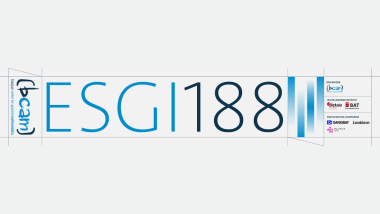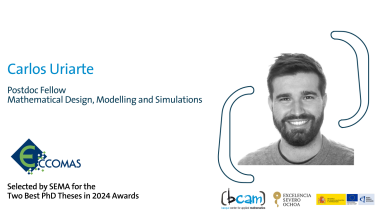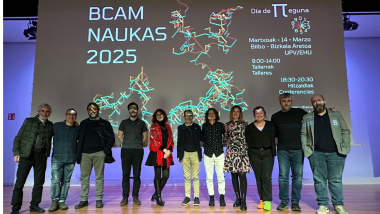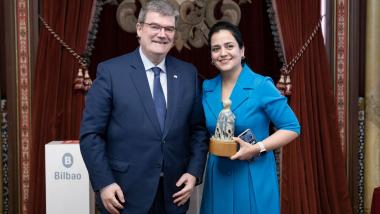Sonali Das will come to BCAM through Science by Woman program under the Women for Africa Foundation
The Professor of University of Pretoria will work with Prof. Dae-Jin Lee
FM´A is a Spanish private, non-profit entity created in February 2012 by María Teresa Fernández de la Vega, the former vice president of the Government of Spain. Its mission is “to promote African women’s leadership in scientific research and technology transfer and to foster the capacity of the research centers in their home countries”. In 2020, 19 applicants received the awarded, with two from South Africa, who have the opportunity to partner with a Spanish institution under their aegis for six months.
Could you tell us about yourself?
My name is Sonali Das and I live in Pretoria, the Jacaranda city, in South Africa. Spatially, I draw on my privilege of growing up in India, Nigeria, the US and now in South Africa, while intellectually, I draw on my privilege of studying Statistics which allows me to indulge into any field where data is used to unravel phenomena. I completed my Masters in Statistics from the University of Calcutta (India), and after a stint in computer applications, I joined the PhD program at the University of Connecticut (USA) under the tutelage of Prof Ming-Hui Chen. In 2006 I moved to South Africa, and joined the Council for Scientific and Industrial Research (CSIR) in 2007, where I was fortunate to work on a number of inter-disciplinary projects. During my time at the CSIR, I was also a Visiting Associate Professor at the University of the Witwatersrand, and am a Research Associate at the Nelson Mandela University, which allowed me to supervise students and publish with them. I joined the Department of Business Management at the University of Pretoria in 2019 to focus on decision making with data in business applications. I am an Elected member of the International Statistical Institute, and have been an Executive Committee member of the South African Statistical Association (SASA) for many years, and am also the current president of the Bayes group of SASA.
In 2017 I was invited to present a talk at the 1st Women in Science without Borders (WISWB) conference in Cairo, which was an eye- and mind-opening experience for me. It allowed me to not only to interact with women researchers from other scientific disciplines, but also with women coming from a variety of socio-cultural backgrounds, all with the single vision of solving real problems with their contextual intellect. In my ‘thank you note’ to the Chair I had mentioned that I would like to see this conference brought to the south of the African continent someday, and she immediately asked me if I would Chair it the following year. So, in 2018 we hosted a very successful 2nd WISWB in Johannesburg, for which special efforts were made to waive registration fee, as it is often the most common barrier to fix in developing countries to participation, particularly for those from ‘disadvantaged universities’. Since then, I have continued to be eager about identifying and highlighting the representation of women for achieving sustainable scientific solutions. In this journey I have been fortunate to have access to great mentors, role-models, and friends, across gender.
On the personal front, we are a family of four consisting of my very supporting partner Prof R Gupta, and two wonderfully intriguing children who test boundaries every day. My parents need to be acknowledged for their untiring efforts to instil values of decorum, persistence and resilience in our demeanour and thoughts.
What motivated you to join Mujeres´África project?
One of my self-appointed mentors is Prof. Igle Gledhill, who is a South African physicist. She is also a member of the project Global Approach to the Gender Gap in Mathematical, Computing and Natural Sciences: How to Measure It, How to Reduce It? Over many years, we have discussed the role of women in science in general, and in mathematical sciences in particular. Prof. Gledhill forwarded me the call and encouraged me to apply. When I went through the partner institutions list, I was very excited about the research being conducted at the Data Science group at BCAM as their work on multi-dimensional smoothing, functional data methods and spatio-temporal modelling is aligned with my current interest in understanding climate shift patterns in South Africa. I then send an email to Prof Dae-Jin Lee to ask upfront if in the event my proposal was approved, would they be willing to host me, to which I got a very warm and enthusiastic response.
What interests you most about working at BCAM?
As I mentioned above, the research conducted within the Data Science group is very close to my research agenda. But beyond the opportunity with this award, I look forward to a long-term relationship with BCAM, and in due course, extend the collaboration opportunities with them and other researchers with similar interest in South Africa, particularly students and younger academics. Second, I want to take the opportunity to form an FDA interest group in South Africa. Third, I would like to extend this research to other application domains such as to economics, demographics and data arising from biological sciences.
What project will you work on?
So, the project I will work on is in situ climate data from South Africa, and also data from other relevant sources.
What are your expectations of working on BCAM?
Furthering my understanding of FDA methods in dealing with climate data from South Africa. We hope that this specific collaboration will generate publishable research. I also want to continue to strengthen ties with BCAM and enable collaborations with statisticians in South Africa and BCAM, and also leverage on BCAM’s profile and extend our research networks. It would be great if in the future we can have some funding to facilitate exchange visits of students and academics. I see this opportunity as a wonderful gateway for future mutually beneficial partnerships.
Related news
Zentroari buruz
ESGI 188 (European Study Group with Industry) Bilbon izango da 2025eko maiatzaren 26tik 30era
BCAM pertsonak




